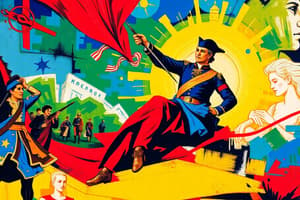Podcast
Questions and Answers
People who could not afford passage to the colonies could become this. Another person would pay their passage, and in exchange, the _______ would serve that person for a set length of time (usually seven years) and then would be free.
People who could not afford passage to the colonies could become this. Another person would pay their passage, and in exchange, the _______ would serve that person for a set length of time (usually seven years) and then would be free.
Indentured Servants
What was the goal of Yeomen Farmers?
What was the goal of Yeomen Farmers?
To be self-sufficient on their own land.
Who were the Planters?
Who were the Planters?
Those who had 20 or more slaves.
What led to the Pequot War?
What led to the Pequot War?
What was the outcome of King Philip's War?
What was the outcome of King Philip's War?
How many American Indians were enslaved in the early 17th century in one colony?
How many American Indians were enslaved in the early 17th century in one colony?
What does the Middle Passage refer to?
What does the Middle Passage refer to?
What was the purpose of the Spanish 'Decree of Sanctuary'?
What was the purpose of the Spanish 'Decree of Sanctuary'?
Why were Sugar Plantations significant?
Why were Sugar Plantations significant?
What crop saved the Chesapeake?
What crop saved the Chesapeake?
What did the Virginia Slave Law of 1662 state regarding offspring?
What did the Virginia Slave Law of 1662 state regarding offspring?
What is Chattel Slavery?
What is Chattel Slavery?
What is meant by Gendered Division of Labor?
What is meant by Gendered Division of Labor?
What does Paternalism refer to in the context of slavery?
What does Paternalism refer to in the context of slavery?
What were Slave Marriages?
What were Slave Marriages?
What was the Puritan Migration?
What was the Puritan Migration?
Who was Oliver Cromwell?
Who was Oliver Cromwell?
What were the Navigation Acts?
What were the Navigation Acts?
What was the Dominion of New England?
What was the Dominion of New England?
Flashcards are hidden until you start studying
Study Notes
Indentured Servants
- Individuals unable to pay for passage to the colonies who could work for a set period (usually seven years) in exchange for their voyage.
Yeomen Farmers
- Predominantly white Southern population who owned no slaves, aiming for self-sufficiency and expected to be well-educated and embody "All American" ideals.
Planters
- Wealthy individuals in the South who owned 20 or more slaves, comprising a minority within the white population.
Pequot War
- Conflict arising from colonial expansion into Pequot territory, leading to the destruction of the Pequot village and the killing of around 400 inhabitants during the Mystic Massacre.
King Philip's War
- A violent conflict (1675-1676) between New England Native American tribes, led by Wampanoag chief Metacom (King Philip), and British colonists, resulting in the end of Indian resistance in New England.
Native American Slaves
- Estimated 30,000-50,000 American Indians were enslaved in the early 17th century, with declining numbers attributed to disease and political factors.
Middle Passage
- Part of the transatlantic slave trade where enslaved Africans were transported to the Americas under brutal and inhumane conditions.
Spanish "Decree of Sanctuary"
- Spanish initiative offering freedom to runaway slaves who escaped to Florida, highlighting differing treatment of slaves by Spanish and English authorities.
Sugar Plantations
- Over four million enslaved Africans were forced to work on Caribbean plantations, known for harsh conditions and high mortality rates, with slave populations vastly outnumbering Europeans.
Tobacco Plantations
- Tobacco, a crucial crop for the Chesapeake region, was cultivated on both large and small farms, relying on a labor force of both indentured servants and enslaved individuals.
Virginia Slave Law 1662
- Legislation establishing that the status of children born to a free parent and a slave would follow that of the mother, solidifying hereditary slavery.
Chattel Slavery
- A form of slavery where individuals are considered property, allowing owners the legal right to buy, sell, and control their lives entirely.
Gendered Division of Labor
- A societal structure where men held public roles while women were primarily responsible for home and nurturing, with societal norms prohibiting women's labor in fields.
Paternalism
- A governing approach treating subjugated individuals like children, meeting their needs while denying them basic rights, commonly practiced by slave owners.
Slave Marriage
- Although informal and not legally recognized by slave owners, these unions had specific ceremonies and customs, often subject to disruption by owners.
Puritan Migration
- Significant emigration of Puritans from England in the 1630s and 1640s to escape persecution, resulting in a tenfold increase in the Massachusetts Bay colony's population.
Oliver Cromwell
- A key figure in the English Civil War who led the Parliamentarian forces, executed King Charles I, and ruled as Lord Protector from 1653 to 1658, establishing a form of dictatorship.
Navigation Acts
- A series of colonial regulations imposing taxes on imported goods from non-British sources, aimed at regulating trade and increasing revenue for Britain.
Dominion of New England
- Established in 1686, a consolidation of northeastern colonies under a royal governor, aimed at increasing control following King Philip's War, leading to eventual revival of colonial self-governance after a revolt against Governor Andros.
Studying That Suits You
Use AI to generate personalized quizzes and flashcards to suit your learning preferences.




